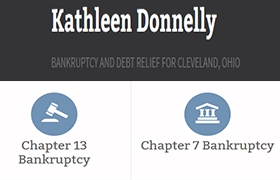Cleveland Bankruptcy & Debt Lawyer, Ohio, page 4
Sponsored Law Firm
-
 x
x

Click For More Info:
-
Law Office of Kathleen Donnelly
526 Superior Ave #1030 Cleveland, OH 44114» view mapChapter 7, Chapter 13, Free Evaluations Need Debt Relief? Contact Me Today
There is hope for debt relief. At the Cleveland, Ohio, law office of Kathleen Donnelly, we help people like you to escape from under mountains of debt.
800-413-4100
Richard T. Spotz
Estate Administration, Wills & Probate, Estate Planning, Bankruptcy
Status: In Good Standing
Stephen M. Bales
Dispute Resolution, Arbitration, Americans with Disabilities Act , Bankruptcy, Estate
Status: In Good Standing
Christopher E. Soukup
Commercial Leasing, Corporate, Business Organization, Collection
Status: In Good Standing
William L. Spring
Elder Law, Business Successions, Business Organization, Dissolution
Status: In Good Standing
Robert L. Metzger
Elder Law, Business Successions, Business Organization, Dissolution
Status: In Good Standing
FREE CONSULTATION
CONTACTFREE CONSULTATION
CONTACTKirk W. Roessler
Corporate, Business Organization, Collection, Commercial Bankruptcy
Status: In Good Standing Licensed: 32 Years
Patrick J. O'Malley
Construction, Family Law, Collection, Products Liability
Status: In Good Standing
David Michael Benson
Foreclosure, Real Estate, Bankruptcy, Bankruptcy & Debt
Status: In Good Standing Licensed: 31 Years

 Kathleen Donnelly Cleveland, Ohio
Kathleen Donnelly Cleveland, Ohio About UsKathleen Donnelly
About UsKathleen Donnelly Contact UsCall or Email Right Now
Contact UsCall or Email Right Now
